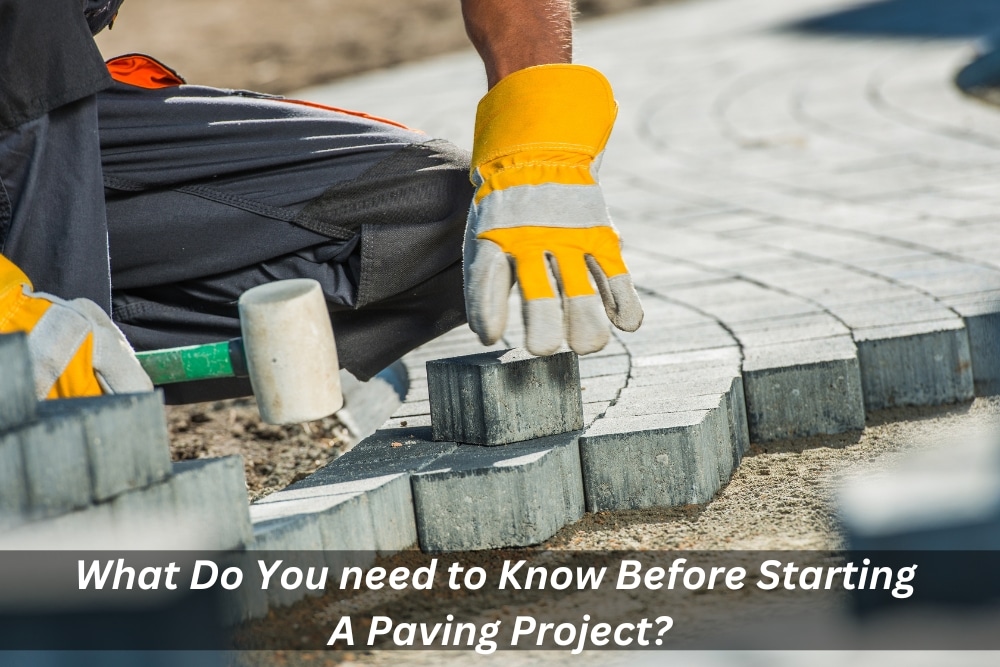Paving projects are often very complex and require lots of preparation. If you don’t get started early enough, you might miss out on some important deadlines. What should you consider before starting a paving project?
Paving projects like retaining walls are usually large-scale construction projects. They involve laying down concrete or asphalt over existing surfaces such as roads, parking lots, sidewalks, etc. The main goal is to improve road conditions and create new areas for development.
Before starting a paving project, you’ll want to determine whether you need permits from local authorities. This will depend on where you live and the type of work you plan to do. For example, if you’re planning to lay down asphalt in your driveway, you won’t need a permit. However, if you’re going to be installing water pipes under the pavement, you’ll likely need a license.
You also need to make sure that you have all the necessary equipment and materials ready. It’s not uncommon for people to start working on their paving project without having everything they need. Make sure that you’ve got all the tools and materials you need before you begin.
You’ll also want to prepare yourself mentally. When you’re about to start a paving project, it can be easy to become overwhelmed by the amount of work involved. Don’t let this happen! Instead, take time to think through what you’re doing and how you will accomplish it.
The last thing you want to do when you’re about to start your paving project is to rush into things. Take your time and ensure that you know exactly what needs to be done. Otherwise, you could end up spending more money than expected.
If you follow these tips, you’ll be able to avoid any problems while you’re working on your paving project.
What is the difference between asphalt and concrete?

There are two main types of pavement: asphalt and concrete. Both are made from aggregate (small pieces of rock) mixed with cement. However, they have different properties.
Asphalt is a mixture of bitumen and gravel. Bitumen is a sticky substance found in tar. Gravel is small rocks.
The mixture is heated until it becomes liquid. This process creates asphalt.
Concrete is a mixture of water, cement, and aggregates. Aggregates include pebbles, natural stones, crushed stones, and sand. Cement is a powdery substance that hardens when mixed with water. Water is added to the mix to create concrete.
Both asphalt and concrete are useful materials for paving projects. They are both easy to apply and inexpensive. However, asphalt is better suited for indoor applications. It’s also more flexible and forgiving.
Concrete is better suited for outdoor applications. It’s stronger and more durable. It’s also more rigid.
What is concrete, and what are its advantages over asphalt?
Concrete is an excellent paving product because it provides many benefits. Concrete is durable, long-lasting, and low maintenance. It is also resistant to extreme temperatures and weather conditions. In addition, concrete is fireproof, which means that it doesn’t burn easily.
Concrete is also versatile. It can be used for both interior and exterior applications. It can even be used indoors. Concrete is commonly used for driveways, walkways, patios, pool decks, and other outdoor structures.
However, there are disadvantages to using concrete. First, concrete is heavy. Therefore, it requires special machinery to pour and spread it.
Second, concrete is expensive. Third, concrete takes longer to dry than asphalt. Fourth, concrete must be sealed after installation. Finally, concrete is difficult to repair.
How does concrete compare to asphalt?
Asphalt is another popular choice for paving. Asphalt is easier to install than concrete. It is lighter in weight, less expensive, and dries faster. It is also cheaper to maintain than concrete.
However, asphalt has several drawbacks. First, asphalt is susceptible to cracking. Second, asphalt isn’t as durable as concrete. Third, asphalt is flammable.
Fourth, asphalt is more vulnerable to environmental damage. Fifth, asphalt is not suitable for use outdoors. Sixth, asphalt is not waterproof. Seventh, asphalt is not very attractive.
Which one should I choose?
It depends on your situation. If you’re looking for something cheap and quick, then asphalt might be the best option. On the other hand, if you want something durable and beautiful, then concrete is probably the way to go.
In either case, you’ll want to consider the pros and cons of each type of pavement. Then, decide which one will work best in your particular situation.
Should I hire a contractor or do it myself?
If you have experience working with concrete, then you may be able to handle the job yourself. Otherwise, you’ll likely need help from a professional.
Hiring a professional can save time and money. Plus, they know how to properly prepare the area before laying down the concrete.
When hiring a professional, make sure that they provide you with a detailed written estimate. Also, ask them about their insurance coverage. This will ensure that you’re covered in case anything goes wrong during the project.
You should also check out the company’s reputation. Ask friends, family members, neighbours, and business associates for recommendations.
Finally, look at the company’s past jobs. Are they reputable? Have they been highly recommended by others? How did they perform?
These questions will give you insight into whether or not this company is worth hiring.
If you decide to hire a professional, here are some tips to keep in mind:
1) Make sure that the paving contractor has proper licensing and liability insurance.
2) Find out what types of warranties are offered.
3) Get estimates from multiple contractors.
4) Hire someone who is experienced.
5) Check references and credentials.
6) Be wary of companies that offer too-good-to-be-true deals.
7) Don’t pay until everything is done.
8) Always get an itemized invoice.
9) Keep track of payments.
10) Never sign any contract without reading it first.
11) Get a written warranty.
12) Read the fine print.
13) Ask for a copy of the contractor’s license.
14) Ask for proof of insurance.
15) Ask for copies of previous contracts.
With these tips in mind, you’ll be well-prepared when you start planning your next paving project!
How long will a driveway take to pave?
The length of time it takes to lay a driveway depends on the size of the project. The larger the project, the longer it will take.
For example, a 10-foot wide driveway would take roughly two weeks to complete. However, a 20-foot wide driveway would take four weeks to finish.
A driveway is usually laid over a gravel base. Sometimes, however, a concrete base is used instead. In both cases, the process is similar.
First, the area where the driveway will be located must be prepared. This includes removing weeds, grass, shrubs, trees, etc. It also involves clearing away rocks, debris, and trash.
Next, the ground needs to be compacted. This ensures that there aren’t any large holes or bumps that could cause problems later on.
After the surface is ready, the driveway is poured. Depending on the material being used, the driveway might take anywhere from three to six hours to pour.
Once the driveway is finished, it needs to be levelled. This ensures that the driveway is level across its entire width.
Next, the driveway needs to be sealed. Sealing helps prevent water from seeping into cracks and crevices.
Finally, the driveway is given a final coat of paint. This gives the driveway a nice, new appearance.
How do I choose a good driveway sealer?
There are many different kinds of driveway sealers available today. Some are more effective than others.
Some sealers contain chemicals that can damage your driveway. Others don’t contain enough chemicals to protect your driveway properly.
When choosing a driveway sealer, make sure that it contains a high percentage of acrylic resin. Acrylic resin is a type of polymer that bonds to asphalt and concrete surfaces.
It also provides protection against UV rays, which makes it ideal for outdoor applications.
Another important factor to consider is how easy it is to apply. If you have to use a lot of elbow grease, then you should probably look elsewhere.
Planning your paving projects is essential to ensure that they go smoothly. By following these simple guidelines, you’ll be able to avoid common mistakes and save yourself some money along the way.
If you’re looking for professional paving in Sydney services, you can contact us at 0451 267 287. We have a team with years of experience providing high-quality paving solutions at affordable prices.



